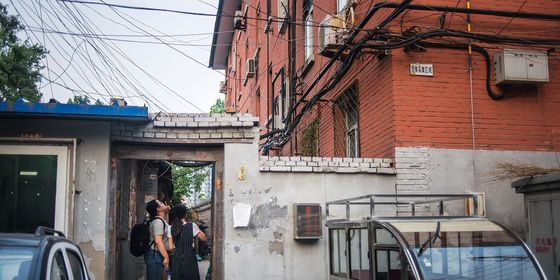Navigating the malicious world of renting in China
If you’ve previously run the renting gamut, there are few things more stressful or horrifying than having to find a home in China—a callous, hateful chore in an industry of malignant cheats and monstrous profiteers. Even the most worldly and sophisticated tenants can get hooked into various traps, and it’s even worse for fresh graduates and couples just starting out on their own. Although you really need a series of books and quite possibly some anti-personnel mines to truly improve and enjoy your inevitably painful renting experience, hopefully this brief guide will help you deal with a few of the more common situations and obvious traps of the process.
Your goal is clear: rent without getting ripped off by the agents. The first thing to do would be to look for the information online. In China, the most often used classified websites are ganji.com (赶集网 Gǎnjíwǎng) and 58.com (58同城 Wǔbā Tóngchéng), but different cities may have more local options. Once you click on “租房” (zūfáng, rent an apartment), you will find yourself drowning in available housing options. You’ll want to narrow down your choices by carefully deciding your location (区域 qūyù), renting price (租金 zūjīn), type of apartment (房型 fángxíng/厅室 tīngshì), and whether you want to rent a whole apartment or just a single room under “renting preference” (方式 fāngshì).
I’m looking for an apartment with two bedrooms and one living room.
Wǒ yào zū yí gè liǎng shì yì tīng de fángzi.
我要租一个两室一厅的房子。
I need an apartment on subway Line 2.
Wǒ yào zū dìtiě èrhàoxiàn yánxiàn de fángzi.
我要租地铁二号线沿线的房子。
I just need to rent a master bedroom/guest bedroom.
Wǒ zhǐ xūyào zū yì jiān zhǔwò/cìwò.
我只需要租一间主卧/次卧。
Keep in mind that real estate agent (房屋中介 fángwū zhōngjiè) is purported to be among the least trustworthy professions in China. In fact, it’s best if you can simply bypass them and sign a lease directly with the landlord (房东 fángdōng). It’s not that landlords are more trustworthy (obviously), but you don’t need to pay an agency fee, it’ll be cheaper overall, and you’ll have a much better chance of getting your deposit (押金 yājīn) back. You can screen for agents by choosing “100%个人房源 (bǎi fènzhī bǎi gèrén fángyuán),” which means “apartments that are 100 percent advertised by owners.” Remember to always ask if you are dealing with a landlord or an agent.
Is this apartment rented by yourself or by an agency?
Qǐngwèn zhège fángzi shì nín gèrén de háishì zhōngjiè de?
请问这个房子是您个人的还是中介的?
Are you the landlord?
Nín zìjǐ shì fángdōng ma?
您自己是房东吗?
The answer is not likely to be “yes”, so they’ll say:
No, I’m the sublessor/agent.
Bù, wǒ shì èrfángdōng/zhōngjiè.
不,我是二房东/中介。
Renting directly from a landlord is no easy feat, so appreciate it when you finally get the chance. When you have to rent from agencies, make sure you know the agency’s reputation, using the likes of HomeLink and 5i5j. If you are renting from an obscure agency, try searching its name online to make sure it is not on the “black agents list” (黑中介名单 hēizhōngjiè míngdān) in your local area. Keep an eye out for apartments with pictures and prices that look too good to be true and stay away from them—these are never real and contacting these agencies will only waste your time. It’s not offensive to ask:
Are the apartment photos you posted online real?
Nín zài wǎngshàng fàng de shì fángzi de zhēnshí túpiàn ma?
您在网上放的是房子的真实图片吗?
When you look at apartments, remember to do it the Chinese way: even when you feel very satisfied with the apartment you are looking at, only look moderately interested at most and bargain for better conditions. You can always negotiate for lower rent, a discount on the agency fee, repair of appliances, and maybe even some new electronics. Everything is negotiable before you sign the contract.
This apartment is nice, but I have several other options with better prices.
Zhè fángzi hái búcuò, dànshì wǒ háiyǒu jǐgè xìngjiàbǐ gèng gāo de xuǎnzé.
这房子还不错,但是我还有几个性价比更高的选择。
I’ll consider this apartment if you can give me a 20 percent discount on the agency fee.
Rúguǒ zhōngjièfèi kéyǐ dǎ bāzhé, wǒ jiù kǎolǜ yíxià.
如果中介费可以打八折,我就考虑一下。
I’m not taking the apartment unless you replace the old air-conditioner with a new one.
Qǐng zài wǒ rùzhù qián bǎ zhège jiù kōngtiáo huàn chéng xīn de, bùrán wǒ shì búhuì zū de.
请在我入住前把这个旧空调换成新的,不然我是不会租的。
This apartment looks fine, but can I just have a six-month lease?
Zhège fángzi kànzhe hái xíng, wǒ néng zhǐ zū bànnián ma?
这个房子看着还行,我能只租半年吗?
When you finally decide on an apartment, you need to be particularly careful with the next step: signing the contract (签合同 qiān hétòng). Glory in the magic of how that helpful, polite, beatific agent transforms into an inpatient, rude, frowning stickler. Make sure everything is clear before you sign, or you’re liable to be at the signing table for a long and unpleasant chat.
First, know what extra fees you are going to pay. You don’t have a snowball’s chance in hell of simply paying the rent and walking away. First of all, there’s the agent’s fee which—for putting up the listing and spending an hour arguing with you about fees—is going to cost you a month’s rent. However, if the rent is above 4,000 RMB, it is usually the landlord that pays rather than the tenant. And, that’s just the start of a litany of other fees; there’s the property management fee (物业费 wùyèfèi), the heating fee (暖气费 nuǎnqìfèi), the cleaning fee (卫生费 wèishēngfèi), the cable (有线电视费 yǒuxiàn diànshìfèi), and much more. Take these fees into consideration in your budget and know that everything is negotiable.
What fees am I going to pay other than the rent?
Chúle fángzū wǒ háiyào jiāo nǎxiē fèiyong?
除了房租我还要交哪些费用?
I’m not paying any extra fees other than water, electricity, and internet.
Chúle shuǐfèi, diànfèi hé shàngwǎngfèi, wǒ bù zhīfù rènhé qítā fèiyong.
除了水费、电费和上网费,我不支付任何其他费用。
With most rental contracts in China, rent is done “押一付三” (yā yī fù sān), which means you pay three months’ rent and a deposit that amounts to a month’s rent. Theoretically, you will get that deposit back when your lease is up, but, as we all know, landlords will be landlords, and most tenants cannot get the entirety of the deposit back, regardless of the care that has been given to the apartment. You will likely receive an list of all the things in the apartment you will be responsible for, so check this list very, very carefully. Don’t just make sure the landlord hasn’t added a Faberge egg next to the washing machine; check that everything that slightly broken is noted before you sign. If you don’t, you’ll pay for it with your deposit.
Please note on the contract that the cupboard door cannot be properly closed.
Qǐng zài hétóng shàng shuōmíng chúguì de mén guān bù yán.
请在合同上说明橱柜的门关不严。
There is no microwave in the kitchen–please take that out of the contract.
Chúfáng lǐ bìng méiyǒu wéibōlú——qǐng bǎ tā cóng hétóng lǐ qù diào.
厨房里并没有微波炉——请把它从合同里去掉。
Please state in the contract that Party A is going to pay for the replacement of electronic appliances if they are worn out.
Qǐng zài hétóng shàng shuōmíng, rúguǒ jiāyòng diànqì yīnwèi lǎo jiù ér sǔnhuài, yóu jiǎfāng fùzé gēnghuàn.
请在合同上说明,如果家用电器因为老旧而损坏,由甲方负责更换。
At the end of all this, you’ll have a rented home or apartment. Hopefully your landlord lives far away—preferably in another country—and that will be the last you see of them until you get your deposit back. Some landlords have a tendency to “drop by” unannounced to snoop, whine, or ask for more money on behalf of themselves or the agents. But, hey, apart from reordering the whole of society so that one of the most basic human necessities isn’t in the hands of grifters and miserly land barons, the best you can really hope for is a roof over your head and money in your pocket.












